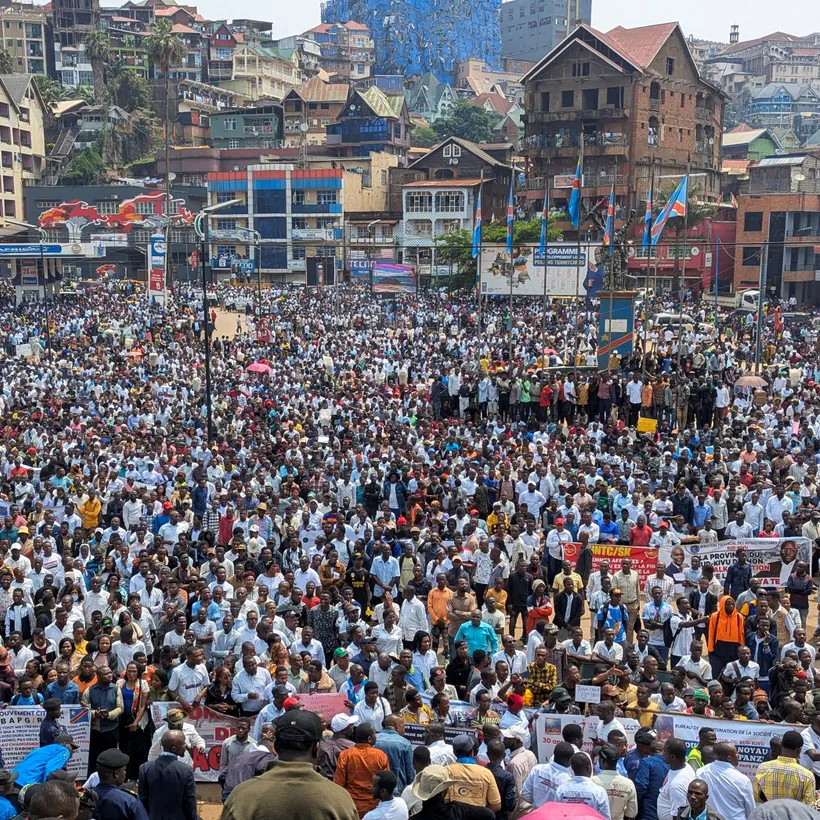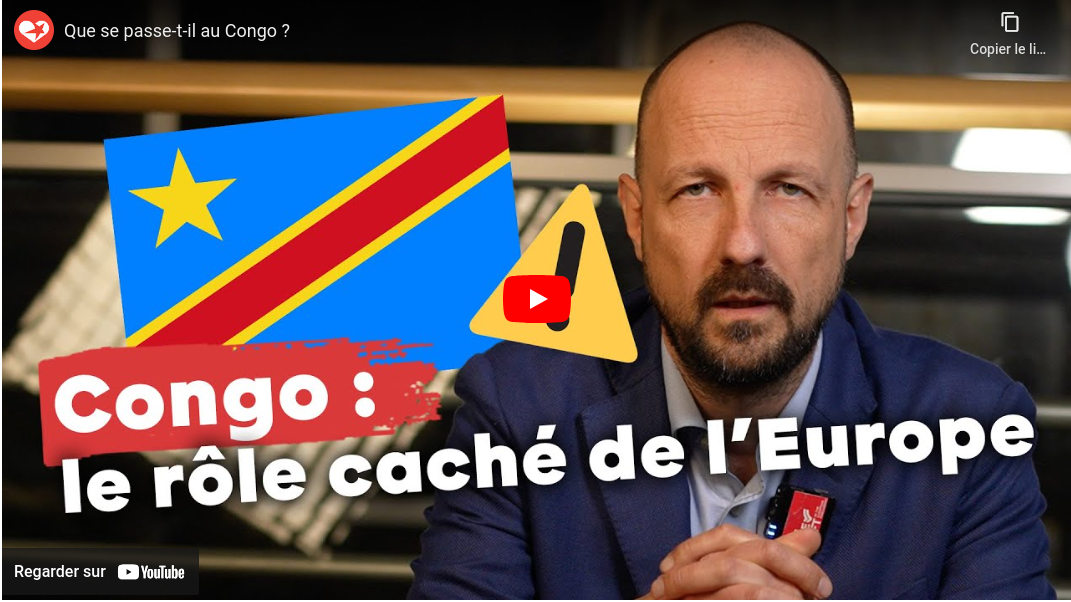Congo: a dirty war for blood minerals threatens to engulf the region
Eastern Congo is the dramatic scene of a war that has claimed 6 million lives over the past 27 years. Today, itʼs the city of Goma - one of the largest cities in the Congo - that is threatened to fall into the hands of Rwanda via the armed militia M23 and the regular Rwandan army present on Congolese soil. Hereʼs a behind-the-scenes look at an invasion that threatens millions of people. [Below find an explainer video by our MEP Marc Botenga in French]

In the Hollywood film "Blood Diamond", we follow Leonardo Di Caprio as he plays off the rivalries between the various armed militias that control Sierra Leone to make his diamond business flourish, with no regard for human life. All this under the approving gaze of the west, which profits handsomely from these "blood diamonds" referred to in the title. Is what is happening in eastern Congo a sequel to the film? No, but the plot is much the same. Synopsis.
Since the beginning of this year, events have accelerated in the mineral-rich region of North Kivu, in the east of the Democratic Republic of Congo (DRC). Since 2009, UN expert reports have virtually all repeated that, in addition to the M23 armed militia - supported and financed by Rwanda - there is a regular Rwandan army on Congolese soil. A territorial violation of the DRC's sovereignty that threatens the local population, victims of regular massacres for almost three decades - and an estimated 7 million Congolese have had to flee their lands in this region.
By Friday, the Congolese side was already counting the dead in Goma. A morbid toll that grows daily, and which also affects Rwanda. None of this bodes well, and an escalation could lead to open war between two countries and set the whole region ablaze.
In order to prevent this, the members of the UNʼs Security Council condemned "the ongoing brazen disregard for the sovereignty and territorial integrity of the DR Congo, including the unauthorized presence in eastern DR Congo of external forces". UN Secretary General Antonio Guterres called on "the Rwandan Defense Forces to stop supporting the M23 and to withdraw from the territory of DR Congo".
At the time of writing, fighting in and around Goma - as well as in Rubavu, just across the Rwandan border - is still raging. But what are the causes?
Rwanda, the world's No. 1 exporter of … Congolese minerals
Radio France sums up one of them, perhaps the most important: "Rwanda, which doesn't have a single coltan or tantalum mine, has become the world's 1st and 3rd largest exporters of these "blood minerals" in just a few years". A third of the world's coltan passes through Rwanda and escapes the DRC! To put it plainly, Rwanda is behaving like an old-fashioned colonial power."
Erik Kenes, senior researcher in the Africa program at the Egmont Institute (Royal Institute for International Relations) explains in an interview with La Libre Belgique : "According to figures from the Central Bank of Rwanda, gold accounts for a third of Rwanda's export revenues, far more than coltan. Yet, according to experts, Kigali only produces 3 kg of gold on its territory."
As in the film mentioned at the beginning, the heart of this dirty war lies in the ground. Coltan is an ore used to produce tantalum, a strategic metal needed in the electronics sector as well as for aircraft, rocket and missile alloys. 60-80% of coltan reserves are located in the Congolese Kivu region. A UN Security Council report last December proves the plundering of Congolese coltan by two Rwandan companies. The decision of M23 to launch an attack and take control of the Rubaya mine (in North Kivu, a mine which produces 15% of the world's tantalum, editor's note) at the end of April 2024 was primarily motivated by a strategic need to monopolize the only viable route for the evacuation of minerals. Since April last year, at least 150 tonnes of coltan have been fraudulently exported from Rubaya to Rwanda.
Towards Rwandan control of eastern Congo?
Is that the only reason? Not according to Erik Kennes, interviewed by Le Soir on January 24: "There is much to suggest - and the latest UN experts' report supports this view - that Rwanda's objective is to take control of eastern Congo."
At the same time, the researcher denounces the false arguments put forward by the Rwandan regime to "justify" its involvement in the region. And especially an alleged threat from FDLR rebels, part of the Hutu genocide perpetrators of 1994: "The FDLR rebels have not committed an attack in Rwanda for over 20 years, and their membership is now estimated at 300. This threat no longer means much. The security problem for Rwanda is the depth of its strategic withdrawal. There are only 150 kilometers between the Congolese border and Kigali, which means that an armed attack could quickly reach the capital. However, there's nothing to show that this could happen. The only threat to the Rwandan government may come from the forces opposed to the regime, who could influence the population to put up resistance. But this in no way justifies the operations being carried out in the east of the DRC."
Europe condemns... but collaborates
The UN has reacted by clearly targeting Rwanda in recent days. The Belgian Minister of Foreign Affairs, the liberal Bernard Quintin, was also forced to react on Monday, January 27: "The capture of Goma is a further and unacceptable violation of the territorial integrity of the DRC and of the Luanda ceasefire. Words alone were not enough. We must act to ensure that international law is respected and preserved."
His French counterpart agreed: "The M23 must withdraw from DRC territory and cease offensives that threaten the lives of civilians and UN peacekeepers", declared Jean-Noël Barrot on the same day.
These strong words go in the right direction, but are insufficient if they are not followed by action. But they are mostly tinged with hypocrisy if you look at recent events. Europe, for example, paid 20 million euros to Rwanda to enable it to deploy in Mozambique to - officially - combat the jihadism that is troubling the north of the country. A further payment of 20 million is under discussion. France voted in favour. Out of humanism? More out of interest: its giant TotalEnergies has invested $20 billion in producing and exporting natural gas in the region... "How can you accept that Rwanda killed 9 UN soldiers in Goma yesterday and that this same country is at the same time one of the biggest contributors to UN peace missions? "said the Congolese ambassador at the extra-ordinary meeting of the Security Council on Sunday January 26. Rightly so, she demanded the immediate withdrawal of Rwandan troops and a cessation of hostilities, as well as an embargo on Congolese natural resources presented as Rwandan. And a revocation of Rwanda as a troop contributor to the United Nations, not to mention full transparency on the transfer of arms to Rwanda.
Agreement between the European Union and Rwanda to plunder resources
More broadly, Europeʼs hypocrisy crystallizes in the "Memorandum of Understanding on Sustainable Value Chains for Raw Materials" signed a year ago by the European Union (EU) and Rwanda. When the EU urged the M23 to "stop its advance" into Congo,PVDA-PTB MEP Marc Botenga thus asked: "What good are these words when the European Union refuses to suspend its Strategic Minerals Protocol with Rwanda, signed a year ago? What good is this rhetoric, when the European Union continues to fund the Rwandan army? "Marc Botenga continues: "Europe continues to actively support Rwanda. Not only through military cooperation, but even through a privileged agreement with Rwanda on raw materials. European policies thus actively support the destabilization and plundering of the Democratic Republic of Congo. Europe must stop interfering and allow Congolese and African dynamics to emerge.
In Ukraine, the European Union claims to defend international law and sovereignty. Why then does it support the violation of Congolese sovereignty? Double standards. Is it because Western multinationals are profiting from the plundering of the Congo's wealth?"
The PVDA-PTB tried to have this agreement suspended a few days ago in the European Parliament. Unfortunately, a majority of MPs from the right and even the socialists opposed it. The left-wing MP concludes: "But we'll keep fighting. War and destruction must be stopped."
"It would be easy to put an end to the troubles caused by Rwanda in the DRC".
Because the urgency is to end Rwandaʼs war of aggression. And itʼs possible. On Sunday January 26, American university professor Jason Stearns, author of The War That Doesn't Say Its Name: The Unending Conflict in the Congo, wrote in the prestigious financial daily The Financial Times : "Western leaders could easily make the difference. That they haven't leads many Congolese to conclude that nobody cares."
In his article entitled "It would be easy to put an end to the troubles caused by Rwanda in the DRC", the specialist elaborates: "Action would be easy because the main instigator of the M23 conflict has been the government of Rwanda, a country dependent on foreign aid. According to six reports by a UN group of experts, Rwanda has sent thousands of troops across the border, deploying surface-to-air missiles, snipers, armoured vehicles and special forces."
And he too denounces the double standards applied by the West: This time around, we seem to be living in a different world — (...) one where we indignantly denounce Russian aggression in Ukraine but shrug when millions are displaced in central Africa."
Africa needs peace, not war
Today, Western countries are rushing to point the finger at Rwanda as solely responsible. But the main culprits in this situation are, first and foremost, the United States and, secondly, Europe. Between 1998 and 2009, the United States initially supported the Rwandan war of aggression, and when it was forced to accept the failure of balkanization in 2003, it refused to accept the presence of Rwandan troops until 2009.
Europe helped ex-president Joseph Kabila between 2001 and 2006 to put an end to this balkanization, and then - when the West deemed him too "sovereignist" - followed the United States in its policy of destabilizing Eastern Congo and weakening the Congolese political class in order to weaken the Congolese state.
Since 2009, the United States and the European Union have systematically put the aggressor and the aggressed back to back, saying that the DRC should break with the FDLR and Rwanda with the M23. However, the FDLR's military weight cannot be compared with that of the M23. Today, the risk of a regional war involving countries like Uganda, Burundi, Angola, South Africa and others has become a real possibility. Once again, Africans risk killing each other because of Western hypocrisy and policies dictated by the interests of multinationals. A majority of countries in the South reject a new war and call for negotiations that will enable the Congolese state to retain its sovereignty and control over its territory.

Our MEP PVDA-PTB Marc Botenga, explains Europe's role in the war in Congo.